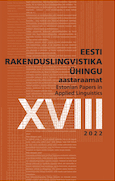TÕLKIJA (DIGI)PÄDEVUS JA ELUKUTSEPROFIILI MUUTUS
TRANSLATORS’ (DIGITAL) COMPETENCE AND THEIR CHANGING PROFESSIONAL PROFILE
Author(s): Terje Loogus, Reelika SaarSubject(s): Computational linguistics, Finno-Ugrian studies, Higher Education , Translation Studies
Published by: Eesti Rakenduslingvistika Ühing (ERÜ)
Keywords: translation; translation studies; machine translation; post-editing; translation technology; Estonian;
Summary/Abstract: In the last few years there have been significant changes in the expected professional profile of translators, mostly due to the evolution of digital technologies. This means new knowledge and skills are required to keep up with the expectations of the translation market. In this article we describe the knowledge and skills needed to become a successful translator of consumer-oriented texts, as per the European Master's in Translation (EMT) competence framework. We look at the results of an international survey among first-year students of the Translation Studies programme of the University of Tartu to analyse how students who have recently started their education in translation assess their own skills in the field. In the second part of the article we take a closer look at the digital competence expected from translators, taking machine translation post-editing as an example. Of all recent developments that require digital competence from translators, machine translation technology is the one that has had the strongest impact on the professional profile of translators and the nature of their work. The fact that providers of translation services are nowadays expected to be able to make use of different sources of technological help does not make all other translation competences less important.
Journal: Eesti Rakenduslingvistika Ühingu aastaraamat
- Issue Year: 2022
- Issue No: 18
- Page Range: 229-243
- Page Count: 15
- Language: Estonian

